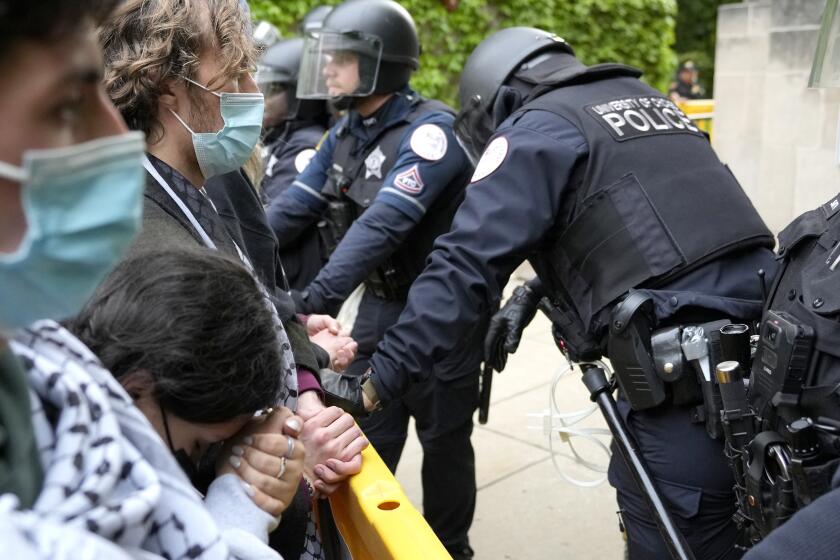Ramon Is Our Future, but What Is His?
Little Ramon will enroll in kindergarten this September. Within a week (the law says within 30 days, but it usually happens the first week) a teacher will take him aside and show him a picture and ask him in Spanish to describe what he sees.
Depending on his response, if indeed he is not too shy or too frightened or too inarticulate to respond, the teacher will assess him as either limited English proficient (LEP) or fluent English proficient (FEP). Not many kindergartners are glib, sophisticated or precocious enough to respond in fluent English, even though some may know the language well enough to do so. If Ramon is classified LEP, this label will stay with him for the rest of his elementary-school life and possibly through high school--unless he joins the 50% of Latino students who drop out.
If there are nine other Latino kindergartners who like Ramon have been classified LEP, they must all be placed in a bilingual program, which means that they will be taught by a bilingual/cross-cultural teacher or an aide. They will be taught to read and write Spanish from Spanish textbooks, and they will learn all subjects--mathematics, science, social studies, etc.--in Spanish until they can prove that they are ready for an English-only class.
The law requires that parents be notified when their children have been placed in a bilingual program, and they have the right to remove the children from the program if they wish. To remove Ramon from the bilingual program his parents must sign a consent form, but their permission is not required before he is placed in the program.
Parental consent is required for placement in special education classes, participation in field trips, football and any number of other activities, but notification only is deemed adequate for placement in bilingual programs.
Do most immigrant parents, whether legal or illegal, educated or illiterate, go to school and challenge the “authorities”? What if Ramon did not live in a predominately Latino district? What if there were only eight other Latino LEP students entering kindergarten?
Ramon and the other eight students would learn to read and write English from English textbooks, and would be taught by a certified English-speaking teacher--not an aide. The law says that when there are 10 or more LEP students they must be placed in a bilingual class. However, if there are fewer than 10, they need not be taught in their primary language. They may be in an English-as-a-second-language class, or in a class in which some Spanish is used, or in an individual learning program in which they would receive some special tutoring as needed.
The Serrano-Priest bill mandates that there be equal dollars behind every student regardless of what school district he or she is in. A good bill. What about a bill that mandates that every student has the right to be instructed in English, no matter which district he or she is in? Why must students who happen to live in Boyle Heights be taught any differently from students who live in Beverly Hills? Is it reasonable, is it right that the underprivileged be denied the opportunity to learn the language of this land just because there are 10 or more of them in a particular class? The years in which LEP students spend reading, writing and speaking Spanish cannot be reclaimed or transitioned into English reading, writing and speaking. It has not happened in the last 12 years. It is not likely to happen in the next five.
And the shortage of qualified, certified bilingual/cross-cultural teachers is not a factor. Even if we could import 2,000 Spanish teachers from Spain instead of the proposed 200, Ramon’s education needs would not be served. Ramon and his classmates will not learn English by being taught Spanish, any more than they will learn the violin by playing the piano. Knowledge is knowledge, but how can it be transmitted except by language, and then the question is, which language?
Would we be robbing 5-year-old Ramon of his language and his culture by instructing him in English? His language is his for as long as he chooses to use it. His culture is his heritage, and no one can take what is inherently his. Language and culture, like religion, are personal freedoms in this country. They are not, nor should they be, public responsibilities.
And are we robbing the Vietnamese, the Cambodian, the Laotian, the Korean, the Hmong, the Samoan, the Filipino and the 89 other primary-language minority students in our schools of their language and their culture by instructing them in English? These students are not in bilingual programs. They do not fail, they do not drop out, and some graduate at the top of their classes.
Will Ramon be overwhelmed, bewildered, confused? What kind of instruction are we talking about in kindergarten? It’s “Sesame Street” stuff, not Shakespeare’s sonnets. It’s building blocks, not calculus.
I believe in Ramon. I think that he could learn the alphabet, numbers and colors in English every bit as quickly as any other student, given the opportunity.
The bilingual program is due to expire on June 30, 1987, but Assembly Bill 2813, if it is not vetoed, will extend the program until June 30, 1992. By that time Ramon will be 11 years old. Will he still be learning Spanish in school and English in the streets? Bilingual education should be reformed to allow Ramon a chance to learn English before its too late. He is our future.
More to Read
Start your day right
Sign up for Essential California for news, features and recommendations from the L.A. Times and beyond in your inbox six days a week.
You may occasionally receive promotional content from the Los Angeles Times.






